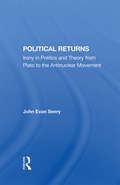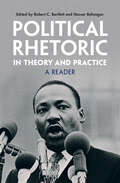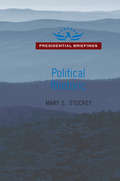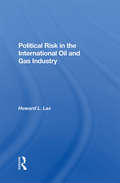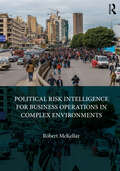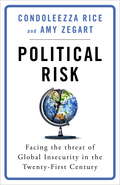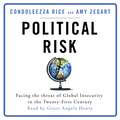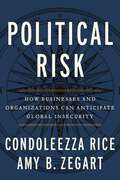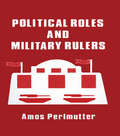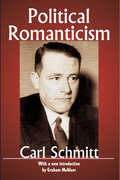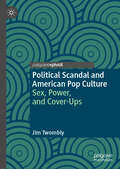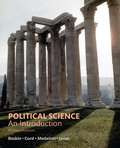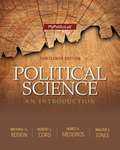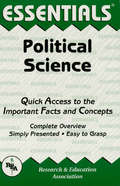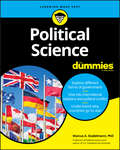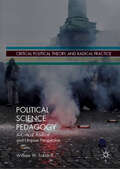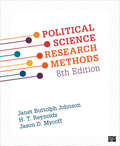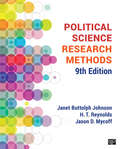- Table View
- List View
Political Returns: Irony In Politics And Theory From Plato To The Antinuclear Movement
by John Evan SeeryThis book presents a theory of the politics of irony and tests this theory through readings of political theory texts and through an analysis of the politics of the contemporary anti-nuclear movement, and argues that political writing must be ironic.
Political Rhetoric in the Oxford and Cambridge Unions, 1830–1870
by Taru HaapalaThis book offers much-needed insight into the Oxford and Cambridge Unions and the important role they have played in nineteenth-century British political culture. Despite this role, or perhaps for that very reason, the Unions have received very little scholarly attention as to their political activities. This study will focus particularly on debating practices through which their members became knowledgeable of the parliamentary way of doing politics. More significantly, it uses the original Union records as primary research material to show that they also had unique political practices of their own. Presenting a detailed analysis of their debates, the book argues that the Unions should be appreciated as independent political arenas, not mere extensions of Westminster politics.
Political Rhetoric: A Presidential Briefing Book (Presidential Briefings Ser.)
by Mary E. StuckeyRhetoric is among the most important and least understood elements of presidential leadership. Presidents have always wielded rhetoric as one tool of governance—and that rhetoric was always intended to facilitate political ends, such as image building, persuasion of the mass public, and inter-branch government persuasion. But as mass media has grown and then fragmented, as the federal bureaucracy has continued to both expand and calcify, and as partisanship has heightened tensions both within Congress and between Congress and the Executive, rhetoric is an increasingly important element of presidential governance.Scholars have derived ways to explain how these developments and the presidents' use of rhetoric have contributed to and detracted from the health of American democracy. This briefing book offers a succinct reflection on the ways in which historical developments have encouraged the use of political rhetoric. It explores strategies of "going public" to provide some leverage over the political system and the lessons one might derive from these choices.This essential analysis, written for lay readers, scholars, students, and future presidents, is the first in Transaction's innovative Presidential Briefings series. Mary E. Stuckey covers the scholarly literature with authority and offers examples of rhetoric that have lasting influence.
Political Risk In The International Oil And Gas Industry
by Calvin Goldscheider Howard L LaxIn this book, the author draws upon his training in political science and experience as an energy consultant at Atlantis, Inc. It explores the conflicting interests of host and firm, and discusses the way firms use political risk analyses leads us to the issue of managing political risk.
Political Risk Intelligence for Business Operations in Complex Environments
by Robert MckellarMacro-level dynamics and modelling are well represented in the mainstream political risk literature. However, not many writings on the subject get their hands dirty in terms of revealing the hard, nuanced and practical work behind knowing what the issues might be for a specific foreign operation in a sensitive or volatile context, and how to plan for them. Political Risk Intelligence for Business Operations in Complex Environments provides international managers, and by extension their organisations, with a foundational understanding of political risk analysis and planning for on-the-ground operations in challenging times and places. This means having a fluid grasp of what political risk means and why it matters in the organisation’s context, and how relevant intelligence can be gathered and analysed to inform decisions and planning towards an operation’s socio-political resilience. The book explains: How and why political risk manifests and the forms it can take Company attitudes and operational attributes as a political risk variable Understanding the operational implications of socio-political dynamics and trends Stakeholder identification and analysis for informed engagement planning Scenario analysis to prepare for long-term contingencies and discontinuities Holistic, intelligence-driven political risk management planning Tactical intelligence exercises to maintain awareness and inform adaptation Intelligence management, collection and quality control Ethical considerations in political risk management Rather than being bound by conventional notions of risk, the book emphasises the dynamic relationship between a foreign operation and its host environment and milieu as a source of both challenges and opportunities to manage them. Concepts, frameworks and practices are rounded out with real-world examples and relevant lessons from the author’s experience as a political risk consultant.
Political Risk: Facing the Threat of Global Insecurity in the Twenty-First Century
by Condoleezza Rice Amy ZegartPolitical risk - the probability that a political action could significantly affect an organisation - is changing fast, and it's more widespread than ever before.In the past, the chief concern used to be whether a foreign dictator would nationalise the country's oil industry. Today, political risk stems from a widening array of agents, from Twitter users and terrorists to hackers and insurgents. What's more, the very institutions and laws that are supposed to reduce uncertainty and risk often increase it instead. This means that in today's globalised world there are no 'safe' bets. Political risk affects companies and organisations of all sizes, operating everywhere from London to Lahore, even if they don't know it.Political Risk investigates and analyses this shifting landscape, suggests what businesses can do to navigate it, and explains how all of us can better understand these rapidly changing geopolitical dynamics.
Political Risk: Facing the Threat of Global Insecurity in the Twenty-First Century
by Condoleezza Rice Amy ZegartPolitical risk - the probability that a political action could significantly affect an organisation - is changing fast, and it's more widespread than ever before.In the past, the chief concern used to be whether a foreign dictator would nationalise the country's oil industry or impose onerous new regulations. Today, political risk stems from a widening array of political agents, from Twitter users and terrorists to local officials, transnational activists, hackers and insurgents. What's more, the very institutions and laws that are supposed to reduce uncertainty and risk often increase it instead. This means that in today's globalised world there are no 'safe' bets. Political risk affects companies and organisations of all sizes, operating everywhere from London to Lahore, even if they don't know it.Political Risk investigates and analyses this shifting landscape, suggests what businesses can do to navigate it, and explains how all of us can better understand and deal with these rapidly changing geopolitical dynamics.Read by Grace Angela Henry(P) Hachette book Group US 2018
Political Risk: How Businesses and Organizations Can Anticipate Global Insecurity
by Condoleezza Rice Amy B. ZegartFrom New York Times bestselling author and former U.S. secretary of state Condoleezza Rice and Stanford University professor Amy B. Zegart comes an examination of the rapidly evolving state of political risk, and how to navigate it.The world is changing fast. Political risk-the probability that a political action could significantly impact a company's business-is affecting more businesses in more ways than ever before. A generation ago, political risk mostly involved a handful of industries dealing with governments in a few frontier markets. Today, political risk stems from a widening array of actors, including Twitter users, local officials, activists, terrorists, hackers, and more. The very institutions and laws that were supposed to reduce business uncertainty and risk are often having the opposite effect. In today's globalized world, there are no "safe" bets.POLITICAL RISK investigates and analyzes this evolving landscape, what businesses can do to navigate it, and what all of us can learn about how to better understand and grapple with these rapidly changing global political dynamics. Drawing on lessons from the successes and failures of companies across multiple industries as well as examples from aircraft carrier operations, NASA missions, and other unusual places, POLITICAL RISK offers a first-of-its-kind framework that can be deployed in any organization, from startups to Fortune 500 companies.Organizations that take a serious, systematic approach to political risk management are likely to be surprised less often and recover better. Companies that don't get these basics right are more likely to get blindsided.
Political Roles and Military Rulers
by Amos PerlmutterThis book represents three decades of Perlmutter's experiences and observations. The author studies the relationship between the military and politics in Middle East, focusing mainly on Egypt as a case study. He concludes by analysing the effect this internal relationship has on military performance.
Political Romanticism (Studies In Contemporary German Social Thought Ser.)
by Carl SchmittA pioneer in legal and political theory, Schmitt traces the prehistory of political romanticism by examining its relationship to revolutionary and reactionary tendencies in modern European history. Both the partisans of the French Revolution and its most embittered enemies were numbered among the romantics. During the movement for German national unity at the beginning of the nineteenth century, both revolutionaries and reactionaries counted themselves as romantics. According to Schmitt, the use of the concept to designate opposed political positions results from the character of political romanticism: its unpredictable quality and lack of commitment to any substantive political position.The romantic person acts in such a way that his imagination can be affected. He acts insofar as he is moved. Thus an action is not a performance or something one does, but rather an affect or a mood, something one feels. The product of an action is not a result that can be evaluated according to moral standards, but rather an emotional experience that can be judged only in aesthetic and emotive terms.These observations lead Schmitt to a profound reflection on the shortcomings of liberal politics. Apart from the liberal rule of law and its institution of an autonomous private sphere, the romantic inner sanctum of purely personal experience could not exist. Without the security of the private realm, the romantic imagination would be subject to unpredictable incursions. Only in a bourgeois world can the individual become both absolutely sovereign and thoroughly privatized: a master builder in the cathedral of his personality. An adequate political order cannot be maintained on such a tolerant individualism, concludes Schmitt.
Political Rumors: Why We Accept Misinformation and How to Fight It (Princeton Studies in Political Behavior #18)
by Adam J. BerinskyWhy debunked political rumors persist and how to combat themPolitical rumors and misinformation pollute the political landscape. This is not a recent phenomenon; before the currently rampant and unfounded rumors about a stolen election and vote-rigging, there were other rumors that continued to spread even after they were thoroughly debunked, including doubts about 9/11 (an “inside job”) and the furor over President Obama’s birthplace and birth certificate. If misinformation crowds out the truth, how can Americans communicate with one another about important issues? In this book, Adam Berinsky examines why political rumors exist and persist despite their unsubstantiated and refuted claims, who is most likely to believe them, and how to combat them.Drawing on original survey and experimental data, Berinsky shows that a tendency toward conspiratorial thinking and vehement partisan attachment fuel belief in rumors. Yet the reach of rumors is wide, and Berinsky argues that in fighting misinformation, it is as important to target the undecided and the uncertain as it is the true believers. We’re all vulnerable to misinformation, and public skepticism about the veracity of political facts is damaging to democracy. Moreover, in a world where most people simply don’t pay attention to politics, political leaders are often guilty of disseminating false information—and failing to correct it when it is proven wrong. Berinsky suggests that we should focus on the messenger as much as the message of rumors. Just as important as how misinformation is debunked is who does the debunking.
Political Scandal and American Pop Culture: Sex, Power, and Cover-Ups
by Jim TwomblyThis book provides a newer definition of political scandal and applies it in a way to remove “ordinary corruption” from the discussion. It then defines pop culture and examines how scandal and pop culture interact. The discussion addresses the question: when does a scandal actually enter into our pop culture. The mechanisms or vehicles by which this occurs include editorial cartoons, Broadway shows, music, movies, television, and more. The first chapter lays out the two main definitions and gives a bit of historical background to the discussion that follows. Chapters 2 through 8 deal with scandals from Watergate to the Trump Administration and from presidents to members of Congress and governors. Chapter 9 ties all of the previous discussion together and makes an assessment of the contemporary state of scandal and pop culture.This book works well as a supplement in a course on American Government, in American Studies, and is aimed at a wide range of readers from college freshmen to more advanced scholars and political junkies.
Political Scandal and American Pop Culture: Sex, Power, and Cover-Ups
by Jim TwomblyThis book provides a newer definition of political scandal and applies it in a way to remove “ordinary corruption” from the discussion. It then defines pop culture and examines how scandal and pop culture interact. The discussion addresses the question: when does a scandal actually enter into our pop culture. The mechanisms or vehicles by which this occurs include editorial cartoons, Broadway shows, music, movies, television, and more. The first chapter lays out the two main definitions and gives a bit of historical background to the discussion that follows. This new edition builds on the previous book with analysis of January 6th, George Santos, allegations of election fraud, and Rudy Giuliani. This book works well as a supplement in a course on American Government, in American Studies, and is aimed at a wide range of readers from college freshmen to more advanced scholars and political junkies.
Political Science (English Medium) class 8 - Karnataka Board
by Karnataka Textbook SocietyThe 8th Standard English Medium Political Science textbook for Specially Abled Students in Karnataka provides a simplified and engaging approach to the subject. Comprising 10 chapters, it introduces students to foundational concepts of political science, including the state, government, citizenship, and fundamental rights. The book emphasizes active learning through discussions, debates, and group activities, fostering critical thinking and self-learning. Each chapter is designed with clear learning objectives and exercises, enabling students to grasp essential political ideas and their relevance in contemporary society. The textbook also connects political science with other social sciences, highlighting its significance in shaping responsible and informed citizens.
Political Science (Fourteenth Edition): An Introduction
by Michael G. Roskin Robert L. Cord James A. Medeiros Walter S. JonesPolitical Science: An Introduction shows readers how the fundamental tenets of political science have helped important leaders make critical decisions for centuries. The authors present a balance of theoretical abstractions and applied reasoning to help readers understand how to make calm, rational choices when it comes to political manipulation. <p><p> The Fourteenth Edition asks readers to explore the controversial topic of exported democracy, and whether certain countries are ready and equipped to apply our form of government. By examining issues such as the Iraq war and the difficulty of adapting our own democracy in the U.S., the text prompts readers to form their own opinions about democracy and political science. Geared toward those learning about the topic for the first time, the authors encourage readers to consider different paradigms, viewpoints, and theories when developing their own political views.
Political Science (Thirteenth Edition): An Introduction
by Michael G. Roskin Robert L. Cord James A. Medeiros Walter S. JonesPolitical Science: An Introduction, 13/e, provides a comprehensive and jargon-free introduction to the field’s basic concepts and themes. It draws examples from the U.S. and other countries to introduce the entire field of political science to new readers. The authors stress how exciting politics can be, balancing practical and theoretical knowledge.
Political Science 11th Standard - Tamilnadu Board
by Training State Council of Educational ResearchPolitical Science Textbook for the 11th Standard Students, preparing for Tamil Nadu State Board Exam.
Political Science 12th Standard - Tamilnadu Board
by Training State Council of Educational ResearchPolitical Science Textbook for the 12th Standard Students, preparing for Tamil Nadu State Board Exam.
Political Science Essentials
by Anita DankerREA’s Essentials provide quick and easy access to critical information in a variety of different fields, ranging from the most basic to the most advanced. As its name implies, these concise, comprehensive study guides summarize the essentials of the field covered. Essentials are helpful when preparing for exams, doing homework and will remain a lasting reference source for students, teachers, and professionals. Political Science covers the major political developments that have shaped the American government today. Includes ancient theories such as Secularism, and modern theories such as Marxism. This book also explains the principles of the constitution and the structure of the American judicial system. Also reviews international relations such as international law and foreign policies. An excellent source book for political studies.
Political Science For Dummies
by Marcus A. StadelmannExpand your political science knowledge with a book that explains concepts in a way anyone can understand! The global political climate is dynamic, at times even volatile. To understand this evolving landscape, it’s important to learn more about how countries are governed. Political Science For Dummies explores the questions that political scientists examine, such as how our leaders make decisions, who shapes political policy, and why countries go to war. The book is the perfect course supplement for students taking college-level, introductory political science courses. Political Science For Dummies is a guide that makes political science concepts easier to grasp. Get a better understanding of political ideologies, institutions, policies, processes, and behavior Explore topics such as class, government, diplomacy, law, strategy, and war Learn the specialized vocabulary within the field of political science Help prepare for a range of careers, from policy analyst to legislative assistant Political science crosses into many other areas of study, such as sociology, economics, history, anthropology, international relations, law, statistics, and public policy. Those who want to understand the implications of changing political economies or how governing bodies work can look to Political Science For Dummies. It’s the book thatcuts through the jargon as it focuses on issues that interest readers.
Political Science Pedagogy: A Critical, Radical and Utopian Perspective (Critical Political Theory and Radical Practice)
by William W. SokoloffThe field of political science has not given sufficient attention to pedagogy. This book outlines why this is a problem and promotes a more reflective and self-critical form of political science pedagogy. To this end, the author examines innovative work on radical pedagogy such as critical race theory and feminist theory as well as more traditional perspectives on political science pedagogy. Bridging the divide between this research and scholarship on both teaching and learning opens the prospect of a critical, radical and utopian form of political science pedagogy. With chapters on Socrates, Frantz Fanon, Paulo Freire, Leo Strauss, Sheldon S. Wolin, e-learning, and a prison field trip, this book outlines a new path for political science pedagogy.
Political Science Research Methods
by Janet Buttolph Johnson Jason D. Mycoff Dr H. ReynoldsUnderstand the “how” and the “why” behind research in political science. Step by step, Political Science Research Methods walks students through the logic of research design, carefully explaining how researchers choose which method to employ. The Eighth Edition of this trusted resource offers a greater emphasis on the ways in which particular methods are used by undergraduates, expanded coverage of the role of the Internet in research and analysis, and more international examples. Practice makes perfect. In the new fourth edition of the accompanying workbook, Working with Political Science Research Methods, students are given the perfect opportunity to practice each of the methods presented in the core text. This helpful supplement breaks each aspect of the research process into manageable parts and features new exercises and updated data sets. A solutions manual with answers to the workbook is available to adopters.
Political Science Research Methods
by Janet Buttolph Johnson Jason D. Mycoff Dr H. ReynoldsUnderstand the “how” and the “why” behind research in political science. Step by step, Political Science Research Methods walks students through the logic of research design, carefully explaining how researchers choose which method to employ. The Eighth Edition of this trusted resource offers a greater emphasis on the ways in which particular methods are used by undergraduates, expanded coverage of the role of the Internet in research and analysis, and more international examples. Practice makes perfect. In the new fourth edition of the accompanying workbook, Working with Political Science Research Methods, students are given the perfect opportunity to practice each of the methods presented in the core text. This helpful supplement breaks each aspect of the research process into manageable parts and features new exercises and updated data sets. A solutions manual with answers to the workbook is available to adopters.
Political Science Research Methods
by Jason D. Mycoff Janet B. Johnson Dr. H. () ReynoldsUnderstand the “how” and the “why” behind research in political science. Political Science Research Methods by Janet Buttolph Johnson, H. T. Reynolds, and Jason D. Mycoff helps you to understand the logic behind research design by guiding you through a step-by-step process that explains when and why a researcher would pursue different kinds of methods. The highly anticipated Ninth Edition of this trusted resource provides more international examples, an increased focus on the role ethics play in the research process, increased attention to qualitative research methods, and expanded coverage on the role of the internet in research and analysis.
